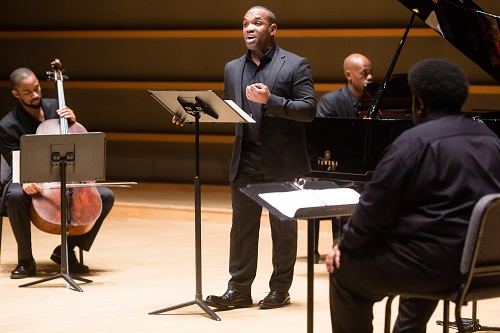 United States Various composers: Lawrence Brownlee (tenor), Randall Mitsuo Goosby (violin), Khari Joyner (cello), Alexander Laing (clarinet), Kevin J. Miller (piano) / Tyshawn Sorey (conductor), Perelman Theater at the Kimmel Centre for the Performing Arts, Philadelphia, 20.2.2018. (RP)
United States Various composers: Lawrence Brownlee (tenor), Randall Mitsuo Goosby (violin), Khari Joyner (cello), Alexander Laing (clarinet), Kevin J. Miller (piano) / Tyshawn Sorey (conductor), Perelman Theater at the Kimmel Centre for the Performing Arts, Philadelphia, 20.2.2018. (RP)

Brahms – Violin Sonata No.2 in A major Op.100, I. Allegro amabile
Barber – Sonata for Violoncello and Piano Op.6, I. Allegro ma non troppo
Johnson – ‘Ride on, King Jesus!’
Still – ‘Bayou Home’
Labenske – ‘Balm in Gilead’
Sorey – Cycles of My Being (world premiere)
By anyone’s standards, the lives of the men sitting on-stage at the Perelman Theater in Philadelphia matter.
Tenor Lawrence Brownlee is in demand in opera houses the world over. He was joined by two MacArthur Fellows (the Genius awards), musician and composer Tyshawn Sorey and poet Terrance Hayes. They were Brownlee’s collaborators in Cycles of My Being, six songs with violin, cello, clarinet and piano accompaniment, which had just received its world premiere on that same stage.
The others were first-rate performers. Twenty-one-year-old violinist Randall Mitsuo Goosby is a student at The Juilliard School and has already soloed at Carnegie Hall. Cellist Khari Joyner also studies at Juilliard and played for President Barack Obama in the Oval Office. Alexander Laing is the principal clarinetist with The Phoenix Symphony. Having performed at the Supreme Court of the United States, pianist Kevin J. Miller just joined the faculty of the University of Houston.
The environments into which they were born did not define them. For Sorey, it was the projects of Newark, New Jersey, while Brownlee spoke of growing up in Youngstown, Ohio, singing in a Baptist church. As a boy living in Tallahassee, Florida, Goosby never paid much attention to race. That changed when he moved to Memphis, Tennessee. No one ever leaps to the conclusion that he is half Korean.
The instrumentalists performed three curtain-raisers. Goosby opened with the first movement of Brahms’ Second Violin Sonata, caressing its beautiful melodies with the exquisite tone of the Guadagnini that he plays. Joyner followed with the first movement of Samuel Barber’s Sonata for Violoncello and Piano, composed in 1932 while he was a student at the Curtis Institute of Music in Philadelphia. Joyner and Miller dug into the passionate melodies that the young composer provided for both instruments.
Laing went a different route, playing arrangements of spirituals, explaining that this was a rare opportunity to explore and connect musically to this part of his heritage. His ‘Ride on, King Jesus!’ was rousing and majestic. In ‘Balm in Gilead’ and William Grant Still’s ‘Bayou Home’, Laing’s mellow, languid sound coupled with the emotional pull of the music and was just perfect.
Hayes’ poems for Cycles of My Being are simple and direct. In ‘Inhale, Exhale’ he asks the question, ‘America – do you care for me, as I care for you?’ He writes of the poet’s song made of love and skin breaking free and becoming a weapon in ‘Whirlwind’. The final one, ’Each Day I Rise, I Know’, evoked the perseverance and optimism of ‘Lift Every Voice and Sing’, but in less sweeping and grandiose phrases.
Bombarded by Brownlee with ideas and suggestions, Hayes told him to write his own poems and so he did. Brownlee penned the searing text of ‘Hate’, as well as two poems of hope. The first spoke of the desperate, dashed dreams of the disillusioned and disenfranchised, while the second was hymn-like, uncertain but optimistic.
Sorey’s musical settings of the texts were eclectic and devoid of cliché. The vocal lines are mostly declamatory. Brownlee imbued them with a glowing, bronze tone, his top notes blazing with passion, although it was the accompaniments that electrified this performance.
The cycle opened with a haunting violin solo, followed by a beautiful melody appearing first in the clarinet and then in the cello. ‘Whirlwind’ was a straightforward song with piano accompaniment, the intensity of the text and vocal line heightened by dramatic chords in the piano. ‘Hope (pt. 1)’ began with a swirl of the violin and cello that evoked Mahler. The solo violin played over rolling chords began ‘Hate’, the most atonal of the songs, while the more hymn-like vocal line of ‘Hope (pt. 2)’ sat easily above a dialogue between clarinet and piano.
The final song, ‘Each Day I Rise, I Know’, began with the calls and responses that African slaves brought with them to America, with Brownlee intoning a phrase and the others echoing him. (Slave owners encouraged singing in the fields, as they believed that it improved morale.) Then it took off with double tonguing in the clarinet, an evocative cello solo and, again, the serene sound of the violin.
These men definitely matter, but in the eyes of some Americans they are still defined by just one thing — their race. Cycles of My Being is not one man’s story, or even that of these men, but aspires to give voice to the collective experience of black men living in today’s America. The response was total silence well after the final notes faded away.
Cycles of My Being was co-commissioned by Opera Philadelphia (where Brownlee serves as artistic advisor), Lyric Opera of Chicago and New York City’s Carnegie Hall as part of its 125 Commissions Project; Brownlee will perform it there with pianist Myra Huang on 24 April. It will be a different experience without the instrumentalists, when all focus is on the singer and his words.
Rick Perdian